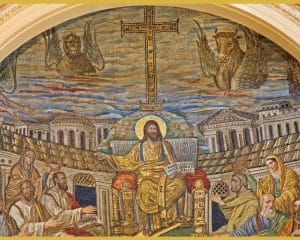Guest post by Quimby
Spunky is busy with her thesis, so she asked me if I could guest-post for this month’s Visiting Teaching message, “If We Do Not Doubt.”
In reading the message what stood out to me the most was this passage: “Most likely, each of Helaman’s 2,060 warriors was influenced by a mother.” Blame it on my contrary nature, but immediately I started to wonder just how many of these men had been influenced by their mothers – if we are to take the phrase “the faith of our mothers” literally, or if it is more figurative. I am going with figurative.
A quick Google search led me to a statistic that, historically, the maternal death rate was 1 per 100 births. Using this we can assume that 200 of these men had mothers who died while they were infants. If we assume that the remaining 1860 men had at least one younger sibling, we can assume that another 186 men had mothers who died when they were too young to really remember them. We could keep going – after all, what are the odds that each woman only had two children? – but for simplicity’s sake we’ll stop there.
Another Google search led to me to a statistic that the average lifespan in pre-Columbia America was 25 to 30. It’s tough to guess what age the stripling warriors would have been; but physically, any boy younger than the age of 12 probably wouldn’t have been able to perform in battle. For argument’s sake, let’s assume they were 12 to 18 years old. Let’s further assume they were all first children, and their mothers had given birth when they were 15. It’s pretty clear that, most likely, the majority of the stripling warriors would not have returned to the homes of their mothers.
Which leads me to ponder the second part of this quote: But these mothers did not act alone.
My dad is one of the most remarkable men I know. He was born into modest circumstances, but managed to provide a very good life for himself, my mother, and their five children. He was born to an inactive mother and a father who was hostile to the church, but he nonetheless managed to marry in the temple. After baptising my mother, they raised us in the gospel as co-parents; and now we are raising our own children in the gospel. Much of this life due to my father’s own dedication; but he also got a boost, as a young man, from his Home Teaching companion, who ensured he always had a ride to and from Sacrament Meeting and youth activities. Without this influence, he may well have left the church. After all, none of his brothers or sisters have remained active.
Because of the dedication of this one man, countless generations are influenced through an inherited dedication of spiritual service that was not celebrated in other family lines. Already we are three generations into the miracle; but in terms of family history, the influence has been even greater: Between them, my parents are responsible for ensuring that the temple work of thousands of our ancestors has been completed. This lone Home Teaching companion truly was one of those righteous men who understood and exemplified his covenants.
A few years ago, my sister lost her husband. He died quite suddenly, leaving behind three children. He was a good and righteous man, who was also blessed with intelligence, patience, and a wonderful sense of humour. His loss was and is deeply felt.
But the Atonement promises us that, somehow, Christ will fill a void. Uncles and grandfathers have played the role of surrogate father, taking my niece on daddy-daughter dates, and accompanying my nephews on father-son campouts. They have attended to baptisms, confirmations, and first temple trips. While nobody will ever take the place of their much-loved and much-missed father, these men ensure that my sister will not have to act alone in raising her children in the gospel.
And even when it seemed impossible, a loving Heavenly Father opened a way for these parents to keep their covenant—and to preserve their liberty. Alma 56:5–9
And even when it seemed impossible, Heavenly Father provided a way for my father to come into the gospel. And even when it seemed impossible, Heavenly Father provided a way for my sister and her children to have the blessings of the Priesthood in their home.
In our neighbourhoods, in our wards, in our circle of friends and acquaintances – Most of us will know a child or someone that needs a loving, caring friend. Perhaps this child or youth or even YSA is missing a parent due to illness, death, or divorce; or perhaps the loss is spiritual or emotional, and not physical. Each one of us has the opportunity to influence that life – to ensure that they have a strong and righteous example.
Each life that touches ours for good reflects Thine own good mercy, Lord . . . What greater gift dost thou bestow than Christlike friends whose gentle ways strengthen our faith, enrich our days . . . For worthy friends whose lives proclaim devotion to the Saviour’s name we praise thy goodness Lord above. -“Each life that touches ours for good”, LDS Hymnal, 293
In closing, I want to go back to the title of the message, If We Do Not Doubt and focus on this line within the message:
Latter-day Saint women who recognize that their strength comes from the Lord’s Atonement do not give up during difficult and discouraging times.
If we do not doubt the power of the Atonement in our lives – if we do not doubt our commitment, and the Lord’s, to the covenants we have made – how can we fail? Individually we will have difficulties; and there may not be a ‘happily ever after’. But if we do not doubt, we can still feel the peace that comes through the atoning sacrifice of Jesus Christ. And then how true will be the words of Alma- “Never had I seen so great courage, nay, not amongst all.”
Closing thought: The fact is that we all have strengths. Not one single one of us was sent here to this earth giftless. Unfortunately, a lot of us have much better vision when it comes to identifying the strengths of others than we have when we look at ourselves- or maybe we are inclined to discount our own abilities, beliving that the only talents that count are the ones that show off well in public. – Beppie Harrison, A Day at a Time, 1994, p. 50.
No matter who you are, you make a difference in someone’s life.
What are some ways I can influence the life of a young person without usurping parental authority? How does living my covenants set an example for the youth in my ward?






6 Responses
Beautiful post! I love how you have encompassed more than just typical mothers, and involved familial relationships as a matter of choice, rather than obligation. Felt liberating to me… choosing to parent, rather than obligating and restricting motherhood to just biological mothers. It encouraged me to think about how I could “mother” some of the elderly women in my ward, for some reason… we all need mothers/parents, don’t we?
Many thanks for this, Quimby.
Thanks for the kind words Spunky. I’ve had the experience of ‘mothering’ older women (and in turn, being mothered by them too). These cross-generational relationships have been amongst the most tender and sweet of friendships. I have mourned with them; I have rejoiced with them; we have shared the secrets of our souls. I don’t think it matters how old we are, we all need someone (or many someones) to love us in that motherly or fatherly way.
Beau and I have become the unofficial/official neighborhood pet therapy family. We walk past a retirement building and there is always a group of elderly residents sitting out front and Beau simply walks up and gives each of the ladies a turn petting him. He loves the attention, and they love the love of a wet nose and some light conversation,(I’m sure for some its the only conversation and attention they get), The Amazing thing is Beau does this without any prompting, and I haven’t herd any complaints so, I guess they all like it.
Its kind of funny actually, because he was the complete opposite when I brought him home. And, now its like he uses any, and all excuses to go up to anyone he meets( I think he’s secretly hoping for a treat)
To further build on the point of both parents being responsible for spiritual upbringing, I think it is important to not a specific chain of events regarding the stripling warriors.
The stripling warriors were influenced spiritually by their mothers. Their mothers were influenced by the sons of Mosiah while on their missions, starting with Ammon. During Lamoni’s conversion (and the conversion of his court), Abish was was instrumental in the gospel taking hold among the people. Abish had been converted as a result of a vision her father had (see Alma 19:16).
The women and men played important roles in establishing an environment in which the stripling warriors could be raised in faith and determination.
Very well said. Thank you for sharing.
[…] Guest Post by Quimby. Quimby’s previous posts are here, here and here. […]